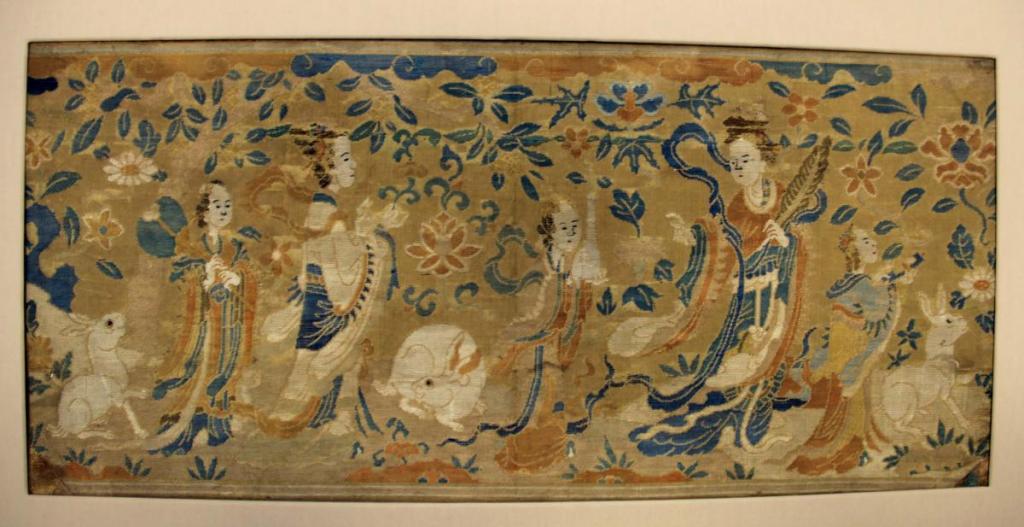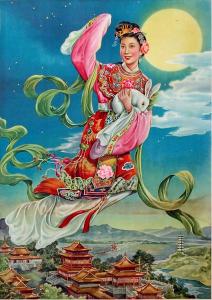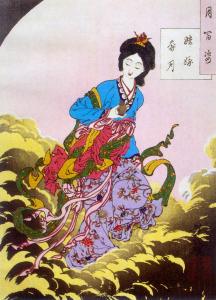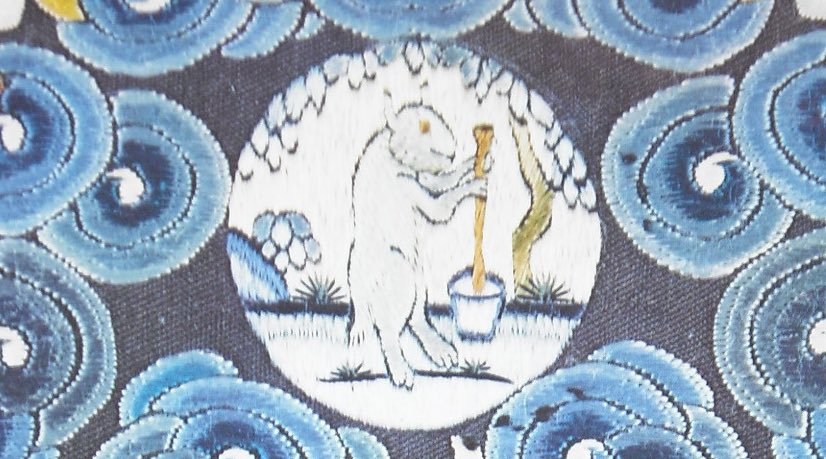In all civilizations there are beliefs, stories handed down from generation to generation. These stories are what we today call "legends" or "myths".
The story of a large ceramic vase full of these legends or myths comes from China. It is very familiar and similar to the Greek one, which we know because it belongs to our western cultural background.
But have you ever wondered if the Greek myths are the same in the Chinese world?
I do! Driven by curiosity, I did some research and the result, as from any self-respecting search, was simply exciting. From the first book I read, I have been fascinated and enchanted. Reading those texts, for a moment, I returned to the young girl, who listened with open mouth to the stories told by my grandmother.
I hope that you too, readers of this short story, will be enchanted and once you have finished reading you will have the "hunger" to understand, that "hunger" that manages to give flavour to our lives.

Chang'e, the Moon Goddess
The Moon, she is the complete female protagonist, mother of every romantic. The Chinese in particular love the Moon so much that they dedicate a festival to it, the famous "Mid-Autumn Festival". It is a party full of traditions and morals. During the celebrations it is customary to burn incense in honour of Chang'e.
Who is Chang'e?
The story of Chang'e is told to children before going to sleep.
In fact there are many versions of this legend, I prefer the more romantic one and it is precisely this version that I will tell you and I will do it with the classic magic words
... Once upon a time, in a very distant village, a large tree overlooking the Eastern Ocean, the tree was so large and tall that its branches reached the sky.
On this tree lived 10 crows which had the onerous task of raising the Sun into the sky. Each raven had its own Sun and every day, in turn, a different raven with a different Sun rose in flight.

Life was in perfect balance, the village men loved the Sun, it gave them energy and food. One day, however, the unthinkable happened, for no reason all the crows rose in flight with each of their Suns.
With the heat of all 10 Suns in the sky, the Earth began to dry up. The heat was too great for the lives of men, lakes and rivers began to dry up, the earth no longer gave food, various blazes devastated the forests and men along with animals could not survive.
Faced with this chaos, the emperor asked for help from the god Dijun, god of eastern paradise, who decided to send the best celestial archer, Hou Yi, to his aid. Hou Yi took his red bow with his white arrows and his wife Chang'e, and went down to the Land of men.
Hou Yi initially tried to make the 10 crows reason, but they did not want to hear reasons and all 10 remained in heaven. At that point in Hou Yi annoyed by the arrogance of the crows he decided to shoot them with his arrows.
He took the first arrow and flung it at the first crow, which fell to the ground with his own Sun. Then he took a second arrow and hit the second crow, then the third and so on, up to the ninth crow. Hou Yi left only one crow alive with his own Sun, necessary to give heat and energy to the Earth.
The god Dijun, when he learned that Hou Yi had killed 9 of his 10 children, got so angry that Hou Yi and his wife Chang'e were forever chased from their heavenly abode and he made them remain forever on Earth by taking away the gift of immortality.
Hou Yi liked life on Earth, taught the art of archery and was a hero of various challenges, but only one thing was missing, his immortality. With the passage of time he began to feel guilty for having forced his beautiful wife Chang'e to give up her immortality forcing her to an earthly life full of hardships.
Hou Yi had to find a way to return to heaven and to regain their immortality.

One day, he learned that a certain lady, the Queen Mother of the West, possessed an elixir of immortality. Then Hou Yi crossed seas and mountains until he reached the presence of the Queen Mother of the West, who knew the fame of the archer and his heroic exploits, and so she immediately gave him the last bottle of the elixir.
Hou Yi now had a great question before him: “what to do? I can't drink the elixir and go up to heaven alone and leave Chang'e here, but I also can't go up to heaven alone. What should I do?"
Tormented by a thousand questions, Hou Yi, once back home decided to hide the elixir.
Days later, Chang'e discovered her husband's secret and, despite the love for her beloved, she was fed up with that life so, on the night of August 15, Chang'e secretly drank the elixir.
Immediately after drinking it, Chang'e began to feel her body to be lighter and lighter and she started to float up into the sky. Chang'e was frightened and started to cry and called her beloved, but when Hou Yi arrived, she had already climbed into the sky floating towards the big bright Moon.

Since that famous night, Chang'e has lived a lonely life on the Moon in her large Guanhangong palace with only one friend: "the Jade rabbit" (Yu Tu) who had been saved from the flames by her.
The story of the jade rabbit goes like this: one day the rabbit together with other animals, driven by the desire to do good, decided to get food for an old traveller.
The rabbit was the only one who could not find food, so he proposed himself as a dish and launched himself into the flames. But Chang'e, struck by the courage and noble heart of the little rabbit, saved him and took him with her to the moon.
It is said that when the Moon is full, if you look at it well, you can see the image of Cheng'e and Yu Tu.
The Chinese love the legends linked to Cheng'e and Yu tu so much that they dedicated the names of the Moon exploration mission to them, called "Chang'e 4", and the mission rover called YuTu 2, in honour of the pure and agile figure of the jade rabbit.








Follow us